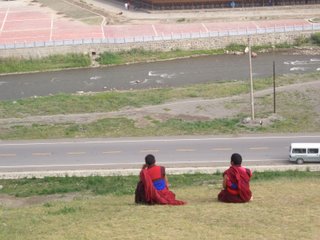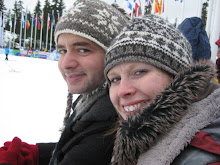 Traveling in China, like living in China, is proving to be a mix of adventure, frustrations, unexpected surprises and unexpected difficulties, but magnified a bit. I'll be gone five weeks so it's dawned on me that more than the most time I've traveled at once it will be the most time I've gone without seeing anyone I know. It's definitely manageable, and cheaper than expected, but I couldn't imagine doing this when I first arrived in China. After being regularly taken advantage of in Thailand and especially Cambodia and my day in Beijing, it's satisfying to travel as an insider who knows the prices and some of the language. I'll give a day-by-day breakdown of the trip as I go along.
Traveling in China, like living in China, is proving to be a mix of adventure, frustrations, unexpected surprises and unexpected difficulties, but magnified a bit. I'll be gone five weeks so it's dawned on me that more than the most time I've traveled at once it will be the most time I've gone without seeing anyone I know. It's definitely manageable, and cheaper than expected, but I couldn't imagine doing this when I first arrived in China. After being regularly taken advantage of in Thailand and especially Cambodia and my day in Beijing, it's satisfying to travel as an insider who knows the prices and some of the language. I'll give a day-by-day breakdown of the trip as I go along.Day 1 (Thursday, the 20th) - Xiahe
I arrived around 7am in the provincial capital of Lanzhou on an overnight sleeper train. Lanzhou isn't of any interest but this is where I needed to catch the 5-hour bus to Xiahe, a small town in the east of this province that was my first destination. I was quick to judge the middle-aged men in the surrounding sleeper bunks of the train as "typical" Chinese men, pudgy men in suits smoking and talking loudly into the night, but then they spent a good 5 or 10 minutes finding out where I needed to catch my bus without my even asking. It seems my guidebook was wrong in the first place, so the first adventure was busing across Lanzhou to two different bus stations before finally getting on a bus to Xiahe just after 9am. I was the last one on and didn't have a true seat, rather a fold-out stool in the aisle with my enormous travel bag on my lap for the trip. I was surrounded by 8 traveling Lithuanians, who reminded me just how good Europeans are at learning English. I was indignant at being overcharged at the lunch stop, which has never happened in Zhangye. I knew it was worth about 3.5 kuai but he dishonestly charged for tea and asked for 10, but it turned out the Lithuanians, who speak no Chinese, were charged 15 each.
Xiahe is a village of around 40,000 people in a remote mountain area, which is of interest because of the Labrang Monastery and the fact that outside of Tibet, it's one of the most important sites of Tibetan Buddhism. It has a beautiful mountain backdrop and more character than any ethnically Chinese city I've yet seen, and is absolutely packed with monks in robes and Tibetans who are local or on pilgrimage, wearing cowboy-style hats and very bright clothes vaguely reminiscent of Southwest Native Americans. There were also more Westerners than I've seen anywhere in China yet; during the guided tour of the monastery there were about three times as many foreigners as live in Zhangye. While I wandered through the Tibetan part of town, three young excitable children followed me and sheltered from the rain with an umbrella. As I suspected they did ask for money, but were very passive about it and perfectly happy with the equivalent of about a dime. For my accomodation I stayed in a simple hostel, which was quite cheap (roughly $3). When I checked into my room there was a Chinese girl in another of the four beds, who then quickly packed up and left. The tall Swede I shared the room with said when she walked in and saw him earlier, she froze and said "Oh my God!" in English and walked out. She probably didn't know what a hostel was like, and knowing China I'm not surprised that it freaked her out.
Day 2
I woke up early to explore to the monastery area, partly because the guidebooks claim that the monks sometimes make friends with travelers and invite them into their homes. I had no such luck, though it was wonderfully peaceful and the sound of monks chanting could be heard periodically (I particularly enjoyed the sound of child monks chanting). With some time before the English tour at 10:15am I climbed a nearby hill, which gave an incredible view over the entire city. The monk who lead the tour spoke only very basic English, and there was a moment about five minutes in when he actually said "My English isn't very good; is there anyone here who would can give some more explanation about this?". There was a long, awkward pause before he continued.
For lunch I treated myself to the common Chinese dish of tudousi chaorou, meat with shredded potato, with the Tibetan twist of Yak meat. A beggar passed by and had the audacity to hit up a monk at the next table for money, which he did give with obvious irritation. After spending just a bit more time hanging around the streets, I caught a 2pm bus back to Lanzhou, which was highlighted by good scenery and helpful English signs like "Don't drive tireply" and "Forbidden to chuck jetsam". Xiahe was an exciting city to visit, but seeing as it's a center of religious devotion, I had to wonder how the Tibetans feel about us making it into a tourist attraction. There were photogenic moments everywhere, but most were very inappropriate to actually take pictures of, such as Tibetans prostrating themselves in prayer. It would have been nice to understand more of Tibetan Buddhism, such as the meaning of prayer wheels (long rows of revolving cylinders they spin as the circle them clockwise).
The room I stayed in in Lanzhou was at least a one-person room, though the bathrooms were shared and like almost all Chinese public bathrooms, left something to be desired. As I approached the men's shower room on the floor below I had a bad feeling I was about to see some full-frontal nudity. I hate being right. The showers were separated by low cement walls, but they felt no need to include doors and there wasn't the least bit of privacy. Chinese people get enough amusement from my long eyelashes and hairy arms, so the two other men showering probably had a story to tell after seeing a foreigner in all his glory. But after five months in China, I think being naked in front of strangers didn't bother me as much as it normally would. And I just really needed a shower.
Day 3 - Tianshui
This morning was spent on a 5 1/2 hour train ride from Lanzhou to Tianshui, another city in Gansu Province. Throughout the ride I noticed what looked very much like man-made cave openings in the mountains, and was reminded of stories I've heard of people in Gansu living in caves in the very recent past (as in, the 1980's). I know my colleague Gary has met someone that told him he lives in a cave (it must be fascinating to talk to people with a high level of Chinese). The point of going to Tianshui is to see a nearby mountain with Buddhist art, so when I arrived in the afternoon it was too late to do anything but wander the city and eat cake in a rare Chinese sweet shop (it was "just so-so" to use a tired Chinglish phrase, and the milk was room-temperature). Oh, and fail to buy a train ticket and wonder if and when I can leave this city. When I tried to buy a ticket to the next city for two days later I was told "no tickets" by the grumpy woman behind the counter, so I tried saying "next ticket to Liuyuan" and was quickly told again "no tickets". Train tickets in China work on an amazingly inconvenient system in which you have to have physically buy tickets at the station in the actual city the train leaves from, no more than a few days early, so during busy times (ie. the whole summer) you have to plan to buy onward tickets as soon as you arrive and hope you don't get screwed. So far here I'm screwed, so I'll try to find someway to get a train ticket or else get a ticket to Lanzhou again and then take a horrible-sounding 22-hour bus. I know of desperate travelers who have stood in the aisles with just a few inches of space around them for overnight trips halfway across the country. Ah, the joys and agonies of traveling in China.

No comments:
Post a Comment